VicRoads mulch wildlife on Mornington Peninsula -AWPC intervention
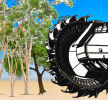 VicRoads doesn't really respect wildlife corridors and rarely includes wildlife crossings in its vast expensive highways, despite its Fauna Sensitive Road Design Guidelines (on what page here to find link to pdf document is unclear). The excuse seems to be that they are too expensive. However VicRoads is costing us all more than money. And last week it sent a giant mulcher to mow down forests of trees which had been planted along the Mornington Peninsula median strips as a climate change mitigation measure by previous regimes.
VicRoads doesn't really respect wildlife corridors and rarely includes wildlife crossings in its vast expensive highways, despite its Fauna Sensitive Road Design Guidelines (on what page here to find link to pdf document is unclear). The excuse seems to be that they are too expensive. However VicRoads is costing us all more than money. And last week it sent a giant mulcher to mow down forests of trees which had been planted along the Mornington Peninsula median strips as a climate change mitigation measure by previous regimes.
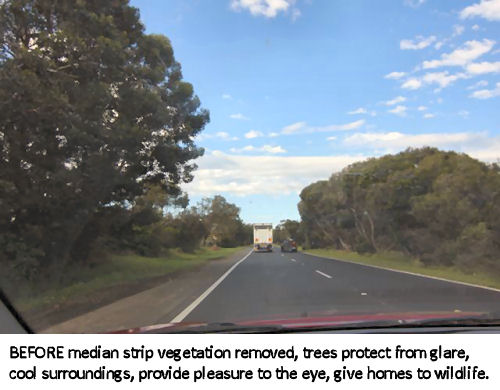
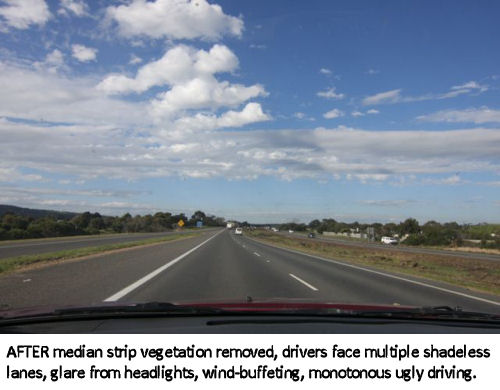
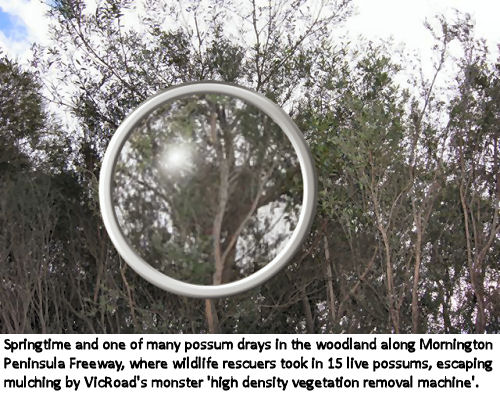
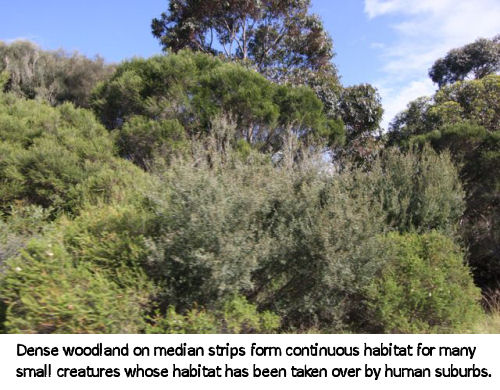
Notwithstanding VicRoads' "Updated VicRoads Tree Policy, 20 January 2017", the corporation hasn't really changed its mechanistic values:
"The updated policy offers increased scope to consider existing trees, not just new plantings, and consideration during planning and development instead of only responding to new proposals. Mr Wall said historically, VicRoads has been seen by the community as prioritising roads, safety and movement over trees and the wider environment."
And went on to confirm that they would continue to prioritise roads over trees.
If VicRoads puts its roadbuilding above the wider environment, on which we all depend, it is plainly out of control, operating within a grandiose belief system that road-builders are more important than anything else.
Recently they announced:
"We’re upgrading the Mornington Peninsula Freeway between Mount Martha and Rosebud to improve safety as part of Victoria’s Road Safety Strategy & Action Plan, Towards Zero 2016-2020 [...]
Australian Wildlife Protection Council manages to interrupt VicRoads program of devastation
And along they came with the enormous tree-mulcher, right at the beginning of Spring, when most birds make their nests. The Australian Wildlife Protection Council (AWPC) Secretary, Eve Kelly, could hardly believe her eyes as suddenly she realised that the considerably forested median strips and roadsides were being mown down at lightening speed by a monster machine. VicRoads had employed a single wildlife spotter who was overwhelmed in her attempts to save any birds, lizards, possums, koalas from the path of the giant mulcher. Eve had more success than most, in getting the Mornington Peninsula Freeway project paused by complaining to VicRoads, when she complained about the plight of the wildlife on behalf of AWPC.
"VicRoads was told the clearing would impact on wildlife now and in the future. "We voiced our concerns about the loss of habitat, and the welfare and care of animals now in rehab at wildlife shelters,' Ms Kelly said later. 'We also raised our concerns about the destructive methods used and the lack of planning, including the time of year this work has commenced.'" (https://issuu.com/southernpeninsulanews/docs/spn_10_october_2017)
There were "reports of dozens of displaced animals, including ringtail possums dropping babies from nests, echidnas and blue tongue lizards being trampled by the authority's 'forestry machine' - and even being mulched alive."
"Ms Kelly said 15 orphaned possums were being hand raised at WHOMP after the drama. Two young ringtails had to be put down."
After complaints, VicRoads met with Brenda Marmion of Ocean Wildlife Shelter, and Eve Kelly and Craig Thomson of AWPC, with Klarissa Garnaut of Wildlife Help on the Mornington Peninsula on speaker phone.
VicRoads stopped the clearing and VicRoads Program Director Bryan Sherrit said the program would be redesigned, that work would restart next year after peak summer season, and that the 'high density vegetation removal machine' would not be reused on this project. He added that 'any future vegetation removal' would use more fauna-sensitive methods.
But trees are not safe with VicRoads and its safe roads project.
VicRoads is a corporation
This is the problem with corporations. They take over state services and run them for profit, and then they start creating work for themselves. VicRoads benefits from overpopulation in Australia, rolling out roads to connect new suburbs, and thinking up new jobs for its friends. Removing trees along roads is one of the more diabolical make-works they have found. They have become like the Cat with the Hat only not so funny with their expanding manic activities, backed up by huge material resources: fossil fuels and machine of inhuman size.
All over Victoria, citizens are trying to stop VicRoads from running roughshod over democracy, contributing to carbon emissions, turning beautiful trees into mulch and displacing Wildlife.
A "Save Roadside Trees in Victoria" website: https://saveroadsidetrees.com/the-problem/roadside-vegetation-issues-non-vicroads/ was formed in October 2016 in response to shocking plans by VicRoads to remove trees from the sides of roads. The first post appears to have been from Latrobe Valley:
"The Latrobe Valley Sustainability Group is protesting VicRoads’ proposal to remove 90 Endangered Strzelecki Gums plus acacias and wattles (including 24 old and very old trees) as part of a road safety project on the Tyers/Traralgon Road in the Latrobe Valley. Latrobe City only has 23% remaining native vegetation."
"A radical plan to remove roadside trees around the State is underway. It is apparently backed by research, but people are continuing to die on roads where trees are completely absent. Is the program, advertised widely as the “Towards Zero” safety campaign simply an environmentally costly experiment? There has been an increase of 13% in deaths from road accidents this year despite the increases in roadside tree removals."
"Conservationist Sue McKinnon said the tree hollows created an important corridor for the movement of phascogales. “The success of the breeding season of the phascogale is dependent on mobility and large numbers of hollows in a wide range as the male runs around over a huge area to find females to breed with, and after this time the male dies,” she said. “If the phascogales’ movement is restricted by removal of hollows along a corridor, the breeding season may fail."
"The Victorian Auditor-General’s Office has produced a document for various authorities to better engage with the community. Auditor-General John Doyle warns “failing to adequately engage the public risks alienating the community and creating negative impacts through poorly informed and implemented decisions.” Look no further than the #WstnHwy Duplication project for an example of where things have gone badly wrong. http://bit.ly/1TLmTWp (https://saveroadsidetrees.com/solutions/
Unfortunately the groups above seem to have got mixed up with Friends of the Earth (FOE), an organisation affiliated with the Socialist Alliance of AntiFa fame, political organisations which take over environmental and other political territory, but don't do much about it. In fact, many people think that, where you see a group affiliated with the Socialist Alliance, that means that the government or corporation will have an easy time.
Australians are also trying to stop the removal of massive trees along the Western Highway. See "The Western Highway Conservation Group," https://www.facebook.com/Savewesthwyveg/
VicRoads has too much power. It should be broken up and road building be returned to local councils, which cannot work as fast and have many other priorities that would dilute the capacity for road-building to take over.
A video of VicRoads tree destruction and roughshod-riding over the wishes of Australian citizens and residents
Vicroads and Transurban Project

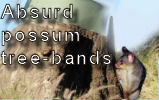 Why do some focus energy
Why do some focus energy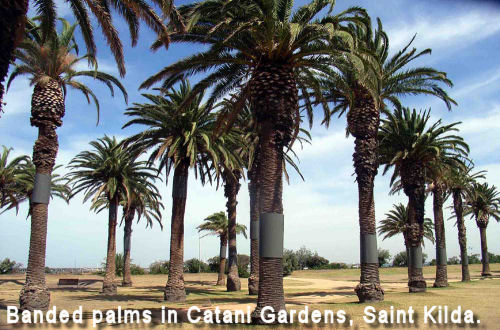
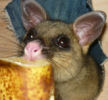 I can hear that collective intake of breath from wildlife warriors and carers all over Australia. Possums as pets? Wildlife as pets! Isn't it bad enough that humans mistreat dogs and cats, without encouraging them to imprison and malnourish possums and other wildlife? See also:
I can hear that collective intake of breath from wildlife warriors and carers all over Australia. Possums as pets? Wildlife as pets! Isn't it bad enough that humans mistreat dogs and cats, without encouraging them to imprison and malnourish possums and other wildlife? See also:  Breakfast at 6pm, delivered to my door by a friendly and tolerant human. Note that I can leave and enter the house anytime and I forage for my own food and sometimes sleep elsewhere. I am a free but friendly spirit.
Breakfast at 6pm, delivered to my door by a friendly and tolerant human. Note that I can leave and enter the house anytime and I forage for my own food and sometimes sleep elsewhere. I am a free but friendly spirit. Baby possum and human interacting
Baby possum and human interacting One of a tribe of possums at Catani gardens, St Kilda, harassed by the Council, falsely and persistently accused of spreading Fusarium wilt
One of a tribe of possums at Catani gardens, St Kilda, harassed by the Council, falsely and persistently accused of spreading Fusarium wilt
 Sure beats Vinny's clothing bins.
I won't pretend that I didn't like that backpack - it reminded me of mum - but I do admit that the possum box is more durable and harder to get me out of. Best of all, the human who placed the possum box here, doesn't try to take it to work with him. We both got a shock when he tried to pack his lunch and novel to take to work the first time.
Sure beats Vinny's clothing bins.
I won't pretend that I didn't like that backpack - it reminded me of mum - but I do admit that the possum box is more durable and harder to get me out of. Best of all, the human who placed the possum box here, doesn't try to take it to work with him. We both got a shock when he tried to pack his lunch and novel to take to work the first time.
 See more about that episode in
See more about that episode in
Recent comments